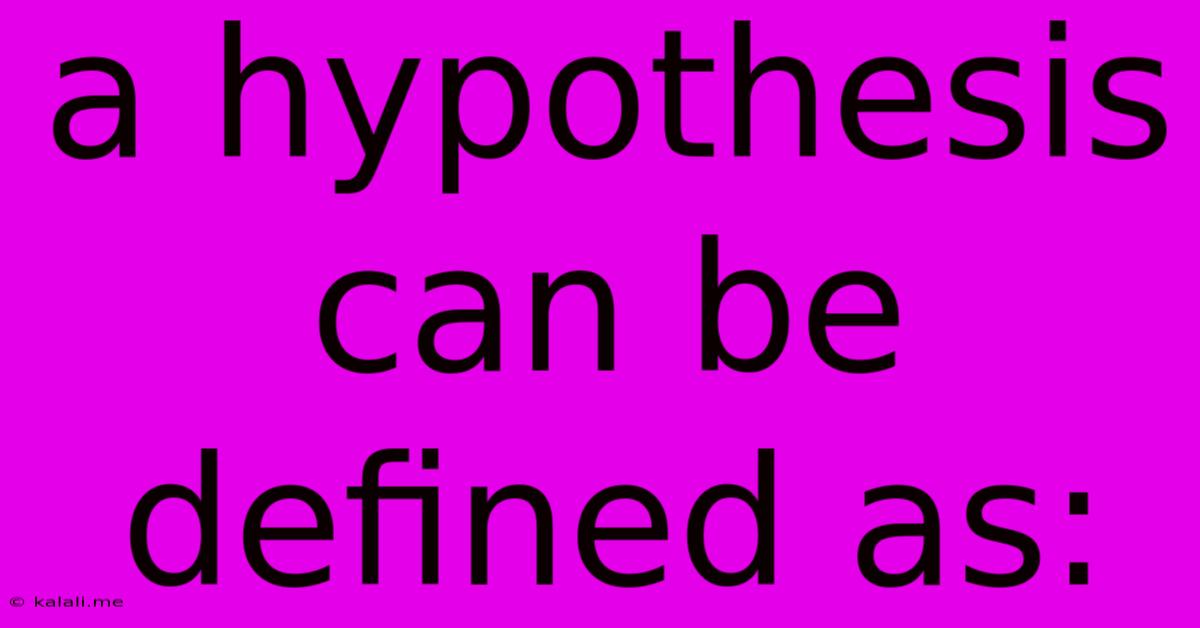A Hypothesis Can Be Defined As:
Kalali
May 10, 2025 · 3 min read

Table of Contents
A Hypothesis Can Be Defined As: A Deep Dive into Scientific Inquiry
A hypothesis is a testable statement that proposes a possible explanation for an observation or phenomenon. It's a crucial element in the scientific method, serving as a bridge between observation and experimentation. This article will delve into the definition of a hypothesis, explore its different types, and highlight its importance in research. Think of it as your roadmap for understanding how scientific knowledge is built.
A good hypothesis is more than just a guess; it's an educated prediction based on existing knowledge and observations. It's formulated to be falsifiable, meaning it can be proven wrong through experimentation. This falsifiability is key; a hypothesis that can't be tested is not a scientific hypothesis. Let's unpack this further.
What Makes a Strong Hypothesis?
Several characteristics define a strong, testable hypothesis:
-
Clarity and Specificity: A hypothesis should be clear, concise, and unambiguous. Avoid vague language and ensure it directly addresses the research question. For example, "Plants grow faster in sunlight" is better than "Plants are affected by sunlight."
-
Testability: The hypothesis must be capable of being tested through experimentation or observation. It needs to be possible to collect data that either supports or refutes the hypothesis.
-
Falsifiability: As mentioned earlier, a crucial aspect of a good hypothesis is that it must be possible to prove it wrong. If a hypothesis cannot be disproven, it's not scientifically useful.
-
Relationship between Variables: A strong hypothesis typically establishes a relationship between two or more variables. This relationship often involves a prediction about how changes in one variable (the independent variable) will affect another (the dependent variable). For example: "Increased carbon dioxide levels (independent variable) will lead to increased plant growth (dependent variable)."
Types of Hypotheses
Hypotheses can be broadly categorized into several types:
-
Null Hypothesis (H0): This is a statement that there is no significant relationship between the variables being studied. It's often the starting point for statistical testing. For instance, "There is no difference in plant growth between plants grown in sunlight and plants grown in shade."
-
Alternative Hypothesis (H1 or Ha): This hypothesis proposes a significant relationship between the variables. It's the opposite of the null hypothesis and is what the researcher is typically trying to prove. For example, "Plants grown in sunlight will show significantly greater growth than plants grown in shade."
-
Simple Hypothesis: This type involves a relationship between only two variables.
-
Complex Hypothesis: This involves a relationship between three or more variables.
The Role of Hypotheses in the Scientific Method
The hypothesis is a central component of the scientific method. The process typically unfolds as follows:
- Observation: Notice a phenomenon or problem.
- Question: Formulate a research question based on the observation.
- Hypothesis: Develop a testable hypothesis to answer the research question.
- Experimentation: Design and conduct an experiment to test the hypothesis.
- Analysis: Analyze the data collected from the experiment.
- Conclusion: Draw a conclusion based on the analysis, accepting or rejecting the hypothesis.
Understanding the definition and characteristics of a hypothesis is fundamental to comprehending scientific research. It provides the framework for testing ideas and advancing our understanding of the world around us. By learning to formulate and test hypotheses, you become a more critical thinker and a more informed participant in scientific discourse.
Latest Posts
Latest Posts
-
Who Are The Sisters Of Kappa Alpha Psi
Jun 30, 2025
-
How Many 24 Ounces In A Gallon
Jun 30, 2025
-
How Much Protein In 8 Ounces Of Chicken
Jun 30, 2025
-
Po Box 30425 Salt Lake City Utah
Jun 30, 2025
-
Is Hilarie Burton Related To Tim Burton
Jun 30, 2025
Related Post
Thank you for visiting our website which covers about A Hypothesis Can Be Defined As: . We hope the information provided has been useful to you. Feel free to contact us if you have any questions or need further assistance. See you next time and don't miss to bookmark.